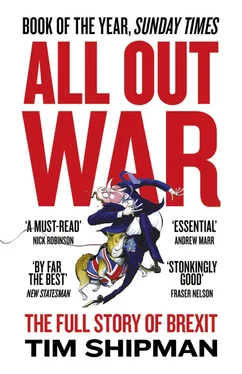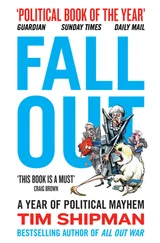Tim Shipman - All Out War - The Full Story of How Brexit Sank Britain’s Political Class
Здесь есть возможность читать онлайн «Tim Shipman - All Out War - The Full Story of How Brexit Sank Britain’s Political Class» — ознакомительный отрывок электронной книги совершенно бесплатно, а после прочтения отрывка купить полную версию. В некоторых случаях можно слушать аудио, скачать через торрент в формате fb2 и присутствует краткое содержание. Жанр: unrecognised, на английском языке. Описание произведения, (предисловие) а так же отзывы посетителей доступны на портале библиотеки ЛибКат.
- Название:All Out War: The Full Story of How Brexit Sank Britain’s Political Class
- Автор:
- Жанр:
- Год:неизвестен
- ISBN:нет данных
- Рейтинг книги:3 / 5. Голосов: 1
-
Избранное:Добавить в избранное
- Отзывы:
-
Ваша оценка:
- 60
- 1
- 2
- 3
- 4
- 5
All Out War: The Full Story of How Brexit Sank Britain’s Political Class: краткое содержание, описание и аннотация
Предлагаем к чтению аннотацию, описание, краткое содержание или предисловие (зависит от того, что написал сам автор книги «All Out War: The Full Story of How Brexit Sank Britain’s Political Class»). Если вы не нашли необходимую информацию о книге — напишите в комментариях, мы постараемся отыскать её.
All Out War: The Full Story of How Brexit Sank Britain’s Political Class — читать онлайн ознакомительный отрывок
Ниже представлен текст книги, разбитый по страницам. Система сохранения места последней прочитанной страницы, позволяет с удобством читать онлайн бесплатно книгу «All Out War: The Full Story of How Brexit Sank Britain’s Political Class», без необходимости каждый раз заново искать на чём Вы остановились. Поставьте закладку, и сможете в любой момент перейти на страницу, на которой закончили чтение.
Интервал:
Закладка:
‘The biggest advocate of the referendum was William Hague,’ a senior Downing Street official said. The foreign secretary told Cameron, ‘You need to do this. I got killed by Europe. A Tory leader needs to nail this once and for all.’
George Osborne did not agree at all. The idea that the chancellor was concerned about the prospect of a referendum became known later, but few have appreciated quite how serious was his opposition. Osborne did not just think a referendum was a bad idea, he thought it was a disastrous idea. In successive meetings he was ‘pretty hostile’ to pressing ahead because he feared the vote would be lost. He warned Cameron he was taking a major risk that several uncontrollable forces would combine in a referendum campaign: ‘anti-government sentiment, opportunism, genuine concern – and then you lose’. The picture Osborne painted was stark and prescient.
Strategically, Osborne saw three problems. The first was that the in/out question was an all-or-nothing proposition. This was not a referendum on integration or membership of the euro – Britain’s membership was on the line. There was no way back if it was lost. The second, he told Cameron, was that the campaign would ‘split the Conservative Party down the middle’. A senior Downing Street source recalled, ‘George’s view was that there’s a good chance we’ll lose, and it will destroy the Tory Party.’ Thirdly, the chancellor had what now seems a more parochial political concern, that with Labour’s Ed Balls and Ed Miliband making overtures to business, Tory support for a referendum would undermine business backing for the Conservatives in the run-up to the 2015 general election. A cabinet colleague said, ‘George’s view was, “Don’t allow your entire premiership to be held hostage to this.”’
Osborne’s plan on Europe was to do what they had done for seven years since 2005, and avoid talking about it. When forced to give firm commitments they would say, ‘No more integration, no bailouts,’ and then hold out the idea of securing some extra powers for the UK as and when the eurozone needed a new treaty change. ‘It’s not perfect, but I reckon it’s better than the alternative,’ he argued.
Given the gravity of the decision and its implications, this was the most important political disagreement Cameron and Osborne had during their six years in power. It is a testament to the strength of their political partnership and their friendship that it never became front-page news, as even minor spats between Tony Blair and Gordon Brown did. Osborne told friends, ‘My partnership with David Cameron has always been predicated on two things: one, he is the boss and I am number two. Second, that where we disagree, we disagree in private – I don’t flounce off or resign or anything like that.’ In the end Osborne could see the way the wind was blowing, and swallowed his doubts. A Downing Street aide said, ‘George is essentially a real pragmatist, so he understood that that’s where we’d end up.’ But the decision would eventually send Osborne over the top in a fight that would define his career, but which he had opposed from the start.
Cameron was a pragmatist too. In opposition, the most prominent portrait on his wall was of Harold Macmillan, the one-nation Tory who had tried to take Britain into what was then the Common Market, until France’s President Charles de Gaulle – the first and most disputatious in a long line of Gallic protagonists – said ‘Non!’ Most Conservative leaders wanted to be Winston Churchill. Most Tory Eurosceptics wanted David Cameron to be Margaret Thatcher, whose best-known sentence on European integration was ‘No, no, no.’ But Cameron wanted to be Macmillan, a common-sense healer of divisions and manager of the nation’s interests. Famously, when asked what was most dangerous for a politician, Macmillan had replied, ‘Events, dear boy, events.’ In his approach to Europe, David Cameron was never more like his hero. Temperamental incrementalism, a propensity to tactically manage rather than strategically plan, and a tendency to be driven by events would all define his response to the issue that now bookends his premiership.
At around ten minutes past eight on 23 January 2013 David Cameron took to the stage at the London head office of Bloomberg, the financial news service, and said to the expectant audience, ‘This morning I want to talk about the future of Europe.’ What followed was the most significant speech given by a British prime minister since Tony Blair made the case for the Iraq War. In its consequences for Britain, it was more far-reaching than that.
In bald, spare words, Cameron sought to confront the issue which more than any other had derailed the careers of Conservative leaders in his adult lifetime. In 1975, when the British public had last been asked its opinion about Europe, Cameron had been too young to vote, and the Tory Party had been broadly united in supporting membership of what was then the Common Market. Yet now, Cameron looked down the lens of the television-pool camera and said, ‘The next Conservative Manifesto in 2015 will ask for a mandate from the British people for a Conservative government to negotiate a new settlement with our European partners … and when we have negotiated that new settlement, we will give the British people a referendum with a very simple in or out choice. To stay in the EU on these new terms; or come out altogether.’ Cameron made clear that he personally wanted an outcome ‘that keeps us in’. He concluded by saying, ‘It is time to settle this European question in British politics.’
The speech marked the end of a long, hard road for David Cameron which began with his speech to the 2006 party conference, less than a year after he won the Tory leadership, when he urged his parliamentary colleagues to stop ‘banging on about Europe’. Even at the time this was naïvely optimistic, since Cameron had already given ground to the Eurosceptics during the leadership election, matching a pledge from his Eurosceptic rival Liam Fox to take the Conservatives out of the European People’s Party (EPP), the main centre-right (but devoutly federalist) grouping in the European Parliament. The promise helped him beat both Fox and David Davis, the former Europe minister known to colleagues as ‘the Old Knuckleduster’. But in the capitals of Europe, leaving the EPP was Cameron’s ‘original sin’, proof that he was another British leader unwilling to play by the rules of the club. Eleven years later it would be a factor, albeit a minor one, in hampering his renegotiation of Britain’s relationship with Brussels. At home it was evidence for the Eurosceptics that, if they pushed him hard enough, he would retreat.
Cameron was no EU enthusiast. When seeking selection as the Tory candidate for Witney, the Oxfordshire seat he was to win in 2001, he characterised his views as ‘no to the single currency, no to further transfer of powers from Westminster to Brussels, and yes to renegotiation of areas like Fish where the EU has been a disaster for the UK’, before adding for good measure, ‘If that is being a Europhile, then I’m a banana.’3 But for the Eurosceptics his heart was not in it. To Cameron, Europe was ‘the E word’. In 2006 he described members of the UK Independence Party as ‘a bunch of fruitcakes and loonies and closet racists’. That not only made a mortal enemy of Ukip’s leader Nigel Farage, but contributed to a belief among the Palaeosceptic – a term I hope describes their longevity without implying that they were old-fashioned – old guard (not unfounded) that he viewed them the same way. Daniel Hannan, the Conservative MEP who was the intellectual godfather of what would become the Leave campaign, first met Cameron when he was running the Conservative Research Department in the early 1990s. ‘I think his view then was that Eurosceptics were like the ancient mariner,’ Hannan said. ‘They were disagreeable bores who would hold you with their skinny hand. I think he approached the European issue through the prism of party management. I don’t think he ever sat down and did a cost–benefit analysis of EU membership. He began from the position, probably true in the 1990s, that a lot of the Eurosceptics were quite difficult and obsessive people.’ Whatever concessions were extracted, the Palaeosceptics came back for more. This was the era when, as the columnist Danny Finkelstein so memorably put it, the Eurosceptics ‘wouldn’t take “Yes” for an answer’.
Читать дальшеИнтервал:
Закладка:
Похожие книги на «All Out War: The Full Story of How Brexit Sank Britain’s Political Class»
Представляем Вашему вниманию похожие книги на «All Out War: The Full Story of How Brexit Sank Britain’s Political Class» списком для выбора. Мы отобрали схожую по названию и смыслу литературу в надежде предоставить читателям больше вариантов отыскать новые, интересные, ещё непрочитанные произведения.
Обсуждение, отзывы о книге «All Out War: The Full Story of How Brexit Sank Britain’s Political Class» и просто собственные мнения читателей. Оставьте ваши комментарии, напишите, что Вы думаете о произведении, его смысле или главных героях. Укажите что конкретно понравилось, а что нет, и почему Вы так считаете.












